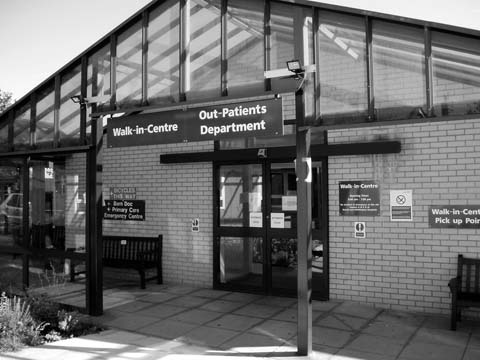| The British Medical Association has revealed that the government intends to privatise the National Health Service's community services... |
Stop Blair destroying the NHS
WORKERS, OCT 2005 ISSUE
While the news headlines have been dominated by war in Iraq and hurricanes in the US, the Blair government has been wreaking havoc on the NHS, one of the world's great social achievements. As reported in the June edition of Workers, plans to hand over NHS facilities to the private sector, via the so-called "independent treatment centres" and other mechanisms, have shown a marked acceleration since Blair was re-elected in May.
The British Medical Association (BMA) has now obtained confidential EU documents which make it clear to the private organisations how they are effectively able to bid for parts of the NHS, and how their market position will be protected. Also over the summer NHS Chief Executive Nigel Crisp released a document called "Commissioning a Patient-led NHS", which has nothing to do with patients or the NHS and everything to do with transfer of NHS community services to the private sector.
Hospital facilities
Immediately after Patricia Hewitt took over as health secretary a deal was advertised in the official journal of the EU inviting private companies to bid for £3 billion worth of contract work to diagnose and treat NHS patients.
In early September when the BMA obtained the confidential documents sent out to the bidding companies, they revealed that the primary purpose was to create "competition" between NHS and private providers, with built-in safeguards for the private sector. It is also clear from these documents that the private companies will be given the opportunity to take over NHS buildings, equipment and staff.
Community services
The plans for community health services share similar features to the plans for hospital services. In particular the hallmark is the fragmentation of a comprehensive integrated service and the transfer of staff to non-NHS organisations. Europe's largest workforce, the NHS, is being systematically dismantled. There is also a sense of dejaˆvu in the "Commissioning a Patient-led NHS". Its themes are almost identical to Thatcher's Community Care Act 1990, which dismantled social care services provided by local authorities and transferred government funding to fragmented and unregulated home care agencies.
Finchley Memorial Community Hospital, London, run by by Barnet Primary Care Trust: even Thatcher did not dare close this hospital, but Blair wants to privatise it.
The document proposes that all services provided outside of hospital including district nursing, school nursing, child health services, sexual health services and the public health infrastructure which deals with infectious disease outbreaks and other public health emergencies should no longer be provided by the NHS. It states that Primary Care Trusts (PCTs) should no longer provide services and by 2008 they should only be allowed to commission such services from the independent or voluntary sector.
Commissioning a patient-led NHS was published on 27 July after the parliamentary recess. It was an act of despotism, as it did not flow from any manifesto commitment or parliamentary discussion. There has been no discussion of it within the Labour Party or amongst Blair's MPs. It currently applies to England only and hence devolution arrangements help fragment opposition. Ironically, a White Paper on community health services was expected in Jan 2006 — presumably a deliberate smoke screen.
'Incoherent'
The NHS confederation, which represents the PCTs as employers, has described the proposals as incoherent, ill thought out and an incredible way to treat important organisations. Although the proposals have been described as privatisation, this may be too benign a description as it is unlikely that private companies exist which could take over many of the functions. Treating sexually transmitted infections or TB is not exactly a money-spinning venture. Beverley Malone, the General Secretary of the Royal College of Nursing, has described it as a process of Americanisation and has pointed out that 40% of Americans do not have access to community health services.
For NHS staff the facts are stark:
- A quarter of a million staff face redundancy or forced transfer to the private sector
- The document states that the expected saving from the reconfiguration of PCTs, Strategic Health Authorities and Ambulance Trusts is to be at least £250 million and this is to be achieved primarily from staffing
- Current NHS battles around changes to pensions and NHS pay from the employers' perspective will be solved
- The destabilisation tactics have already begun with an instruction to NHS organisations not to fill key posts due to the impending reorganisation.
Fighting back
There is unanimity across trade unions, royal colleges and employers' organisations that the proposals are dangerous. Universities and colleges have condemned the proposals as jeopardising training arrangements and as a wilful abandonment of planning for a future workforce. A survey published in the health services journal found widespread unrest over the proposals with 72% of respondents saying they found them incoherent and 65% found them political. In September, Unison took to the TUC an emergency motion which was unanimously carried, and on 21 September they launched a national campaign.
Despite the national impact of the proposals, it will be the response in the individual workplaces which will determine whether this destruction proceeds. For example, in one PCT in Surrey senior nurses and therapists have decided that the way forward is not to oppose the proposals, rather to form themselves into a private company to bid for the work.
Needless to say, the proposal was not taken to a mass meeting of staff for discussion. More typically, a lot of workplaces are not even aware of the government's proposals. There is an urgent need for workplace and union branch discussion.
